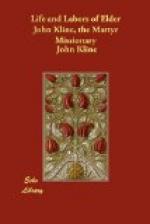Slowly and sadly, with crushed hopes and broken hearts, these two loving disciples of our Lord were wending their way from the scenes of confusion that had attended his crucifixion in Jerusalem to a quiet little village about eight miles distant, called Emmaus. Here, at least, they hoped to find exemption from the taunts and sneers of the infatuated mob in the city, whose mutterings were still to be heard in the distance, like those of a cyclone that has done its work.
I. “THEY COMMUNED AND REASONED TOGETHER.”
The particular point in their conversation is not stated, but it is included in the general topic which is given as “the things which have happened in Jerusalem concerning Jesus of Nazareth.” The imagination here finds scope to multiply themes without limit, on which they could reason, and over which they could be sad. At this very point of time, just when despair, like darkness at the close of an evening twilight, had settled down upon the entire landscape of their mental sight,
II. “JESUS HIMSELF DREW NEAR.”
"But their eyes were holden that they should not know him." This simple statement has more than once caused “smiles in tears;” smiles at the half playfulness of Jesus talking to these two beloved disciples as a tender father sometimes talks to his little children; and tears at the condescending love of Christ our God and Lord, walking as a wayfaring man with two of his heartbroken creatures. Can you take this in, and not fall at his feet and kiss them? Can you take this in, and not look up into his face smiling through your tears?
And then he said: “Behooved it not the Christ to suffer these things and to enter into his glory?” This very sentence, by which he shed the first rays of light upon the dark waters of their storm-beaten bosoms, tells the whole tale of Christ’s redeeming love. The cross and crown! Joy of earth and bliss of heaven! The cross of dishonor; the crown of glory! The cross of death; the crown of life!
“But their eyes were holden, that they should not know him.” He came as the divine Word. He is the truth and the life of the Word; for “the Word was made flesh, and dwelt among us.” Though they knew not that it was he, still their hearts did burn within them as he opened unto them the scriptures. “Beginning at Moses he interpreted to them in all the Scriptures the things concerning himself.” They do not tell us the passages he quoted and explained; but it is believed we have them all in our Bibles. I think it is evident we have all the Scriptures now that were extant then; and it is our great privilege to hunt up for ourselves and others these broken pieces of the Bread of Life.




